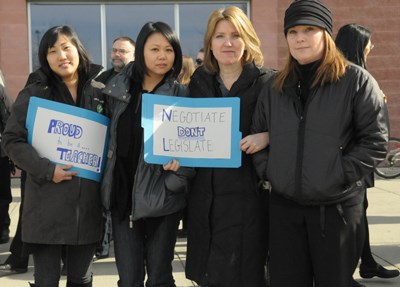The Editor,
Re. "This retired teacher says teachers are already paid enough" (Letters, tricitynews.com, July 20).
As president of the Coquitlam Teachers' Association, I must take issue with the misrepresentations made by the letter writer, Jeannine Silvestrone, in response to The Tri-City News' editorial calling for raises for teachers.
B.C teachers are the second worst paid teachers in Canada. As well, we had very limited ability to achieve a reasonable wage or narrow the gap under the previous government's net-zero mandate and contract stripping.
I do not agree with the idea that "the money would have to come from somewhere." If education funding had only been maintained at 2002 levels, there would be hundreds of millions more dollars in the system to do exactly what the writer asks for: hire more teachers and support staff.
The Canadian average of education funding, according to StatsCan is around 3.5% of gross domestic product (GDP). B.C.'s spending has declined from roughly 3.7% in 2001/’02 to just 2.7% in 2015/’16. This is a significant downward trend in education funding as a percentage of GDP that continues today, so the money was, and is, always there, it was just being redirected to other priorities.
I can't speak for the letter writer, a retired teacher, but teachers I see in the system are working hard for the wage they earn. In just the last couple years, they've had to:
• embrace a full rethinking of the curriculum from kindergarten to Grade 12 (the first full review since the late 1990s);
• embrace an entirely new data collection system in MyEdBC;
• take on an entirely new reporting template and ministerial reporting orders.
As well, they have shown their usual innovation in making education accessible for all the diverse needs in their classroom.
Yes, Coquitlam teachers do enjoy good extended health benefits but that was the result of very assertive collective local bargaining in a climate of mutual respect, back the the 1990s. Teachers in Coquitlam sacrificed salary for three successive collective agreements to get those benefits we enjoy.
The writer is simply wrong in saying that other union jobs don't receive increased salary depending on cost of living. There are many examples, such as isolation allowances or increased stipends for food costs in the north.
Teachers deserve a fairly negotiated and significant increase to make teaching in B.C. comparable with other jurisdictions and a collective agreement that doesn't contain concessions to our hard-won restoration of our class size and composition language.
Ken Christensen, President, Coquitlam Teachers' Association



